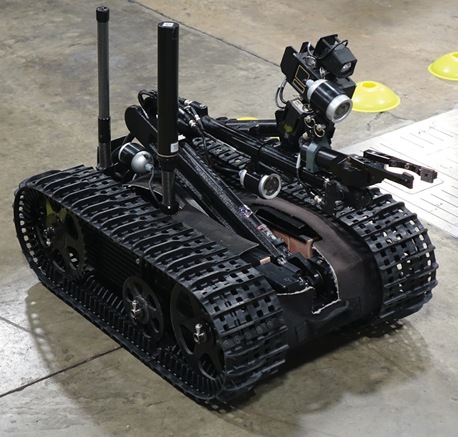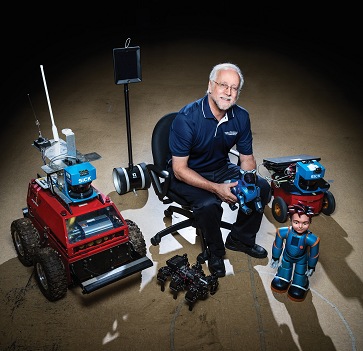Lethal Autonomous Robots and the Plight of the Noncombatant
Lethal Autonomous Robots and the Plight of the Noncombatant
Ongoing meetings of the United Nations in Geneva regarding the Convention on Certain Conventional Weapons consider the many issues surrounding the use of lethal autonomous weapons systems from a variety of legal, ethical, operational, and technical perspectives. Over 80 nations are represented and engaged in the discussion. This talk reprises the issues the author broached regarding the role of lethal autonomous robotic systems and warfare, and how if they are developed appropriately, they may have the ability to significantly reduce civilian casualties in the battlespace. This can lead to a moral imperative for their use, not unlike what Human Rights Watch has attributed regarding the use of precision-guided munitions in urban settings due to the enhanced likelihood of reduced noncombatant deaths. Nonetheless, if the usage of this technology is not properly addressed or is hastily deployed, it can lead to possible dystopian futures. This talk will encourage others to think of ways to approach the issues of restraining lethal autonomous systems from illegal or immoral actions in the context of both International Humanitarian and Human Rights Law, whether through technology or legislation.
Date and Time
Location
Hosts
Registration
-
 Add Event to Calendar
Add Event to Calendar
Loading virtual attendance info...
Speakers
Ronald Arkin of Georgia Tech
Lethal Autonomous Robots and the Plight of the Noncombatant
Ongoing meetings of the United Nations in Geneva regarding the Convention on Certain Conventional Weapons consider the many issues surrounding the use of lethal autonomous weapons systems from a variety of legal, ethical, operational, and technical perspectives. Over 80 nations are represented and engaged in the discussion. This talk reprises the issues the author broached regarding the role of lethal autonomous robotic systems and warfare, and how if they are developed appropriately, they may have the ability to significantly reduce civilian casualties in the battlespace. This can lead to a moral imperative for their use, not unlike what Human Rights Watch has attributed regarding the use of precision-guided munitions in urban settings due to the enhanced likelihood of reduced noncombatant deaths. Nonetheless, if the usage of this technology is not properly addressed or is hastily deployed, it can lead to possible dystopian futures. This talk will encourage others to think of ways to approach the issues of restraining lethal autonomous systems from illegal or immoral actions in the context of both International Humanitarian and Human Rights Law, whether through technology or legislation.
Biography:
Ronald C. Arkin received the B.S. Degree from the University of Michigan, the M.S. Degree from Stevens Institute of Technology, and a Ph.D. in Computer Science from the University of Massachusetts, Amherst in 1987. He then assumed the position of Assistant Professor in the College of Computing at the Georgia Institute of Technology where he rose to the rank of Regents’ Professor, and is now Professor Emeritus. He was the Director of the Mobile Robot Laboratory from 1987-2022. He also served as the Associate Dean for Research and Space Planning in the College of Computing at Georgia Tech from October 2008 to June 2017. From July 2017 to June 2018, Dr. Arkin served as a visiting Fellow/Scientist at the School of Electrical and Computer Science, Queensland University of Technology and the CSIRO Robotics and Autonomous Systems Group, Queensland Centre for Advanced Technologies, Commonwealth Scientific and Industrial Research Organisation, in Brisbane, Australia. During 1997-98, Professor Arkin served as STINT visiting Professor at the Centre for Autonomous Systems at the Royal Institute of Technology (KTH) in Stockholm, Sweden. From June-September 2005, Prof. Arkin held a Sabbatical Chair at the Sony Intelligence Dynamics Laboratory in Tokyo, Japan and then served as a member of the Robotics and Artificial Intelligence Group at LAAS/CNRS in Toulouse, France from October 2005-August 2006. Dr. Arkin’s research interests include behavior-based reactive control and action-oriented perception for mobile robots and unmanned aerial vehicles, hybrid deliberative/reactive software architectures, robot survivability, multiagent robotic systems, biorobotics, human-robot interaction, robot ethics, and learning in autonomous systems. He has over 230 technical publications in these areas. Prof. Arkin has written a textbook entitled Behavior-Based Robotics published by MIT Press in May 1998, co-edited (with G. Bekey) a book entitled Robot Colonies published in 1997, and a book published in Spring 2009 entitled Governing Lethal Behavior in Autonomous Robots published by Chapman-Hall (Taylor & Francis). Funding sources have included the National Science Foundation, DARPA, DTRA, U.S. Army, Savannah River Technology Center, Honda R&D, Samsung, C.S. Draper Laboratory, SAIC, NAVAIR, and the Office of Naval Research. Dr. Arkin serves/served as an Associate Editor for IEEE Intelligent Systems, International Journal of Social Robots, and the Journal of Environmentally Conscious Manufacturing, as a member of the Editorial Boards of Autonomous Robots, Machine Intelligence and Robotic Control, Journal of Intelligent Service Robotics, Journal of Field Robotics, International Journal of Advanced Robotic Systems, and the Journal of Applied Intelligence, and is the Series Editor for the MIT Press book series Intelligent Robotics and Autonomous Agents. He also serves/served as a consultant for several major companies in the area of intelligent robotic systems. He has provided expert testimony to the United Nations, the International Committee of the Red Cross, the Pentagon and others on Autonomous Systems Technology. Prof. Arkin served on the Board of Governors of the IEEE Society on Social Implications of Technology, being elected to a 3-year term (2010-2012) by the membership. He was also elected to serve two consecutive 3-year terms on the Administrative Committee of the IEEE Robotics and Automation Society in both 1999 and 2002, served as a founding co-chair of the IEEE RAS Technical Committee on Robot Ethics from 2004-2009 and co-chair of the Society’s Human Rights and Ethics Committee from 2006 to 2011, is the IEEE RAS liaison to the IEEE Society on Social Implications of Technology, serves on the AAAS Committee on Scientific Freedom and Responsibility from 2018-2023, and also served on the National Science Foundation’s Robotics Council from 2001-2002. In 2001, he received the Outstanding Senior Faculty Research Award from the College of Computing at Georgia Tech, in 2011 he received the Outstanding Achievement in Research Award from the University of Massachusetts Computer Science Department, and was named a Distinguished Lecturer for the IEEE Society on Social Implications of Technology in 2012 and a Distinguished Visitor for the IEEE Computer Society in 2023. He was elected a Fellow of the IEEE in 2003
https://www.cc.gatech.edu/aimosaic/faculty/arkin/index.html
Email:
Address:United States
Agenda
5 pm - Introductions, Start of talk,
6 pm - End of talk, Q&A
6:45 pm - End of event
ALL TIMES are EST/EDT!
An IEEE Southeastern Michigan Section event. All are welcome. Consider becoming an IEEE member if such similar events are of professional/academic interest to you/ All follow ups to organizer. If you like a specific topic to be covered - let the organizer know and also share any favorite speakers/titles!
Media
| Lethal Autonomous Robots | Lethal Autonomous Robots and the Plight of the Noncombatant - FLYER | 343.08 KiB |



